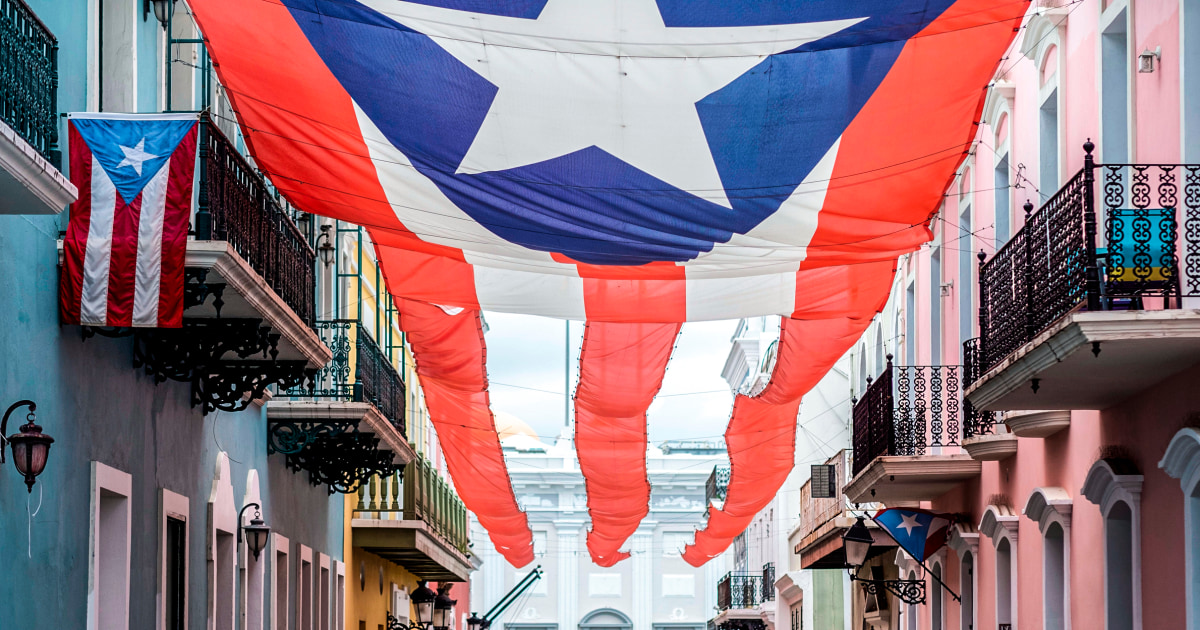The House voted Thursday in favor of the Puerto Rico Status Act, which seeks to resolve the U.S. territory’s status and its relationship to the United States through a binding plebiscite.
In a 232-191 vote, the bill was passed by 216 Democrats and 16 Republicans. All votes against the bill came from Republicans.
The Puerto Rico Status Act was a compromise between members of Congress who previously sponsored competing bills “to end the colonial status of the island,” said Rep. Raul Grijalva, D-Ariz., who sponsored the bill.
It combined elements of two bills: the pro-statehood bill introduced by Rep. Darren Soto, D-Fla., and Rep. Jenniffer Gonzalez, a Republican nonvoting member of Congress representing Puerto Rico; and the Puerto Rico Self-Determination Act from Reps. Alexandria Ocasio-Cortez and Nydia Velázquez, both New York Democrats.
Among the key compromise elements are defining nonterritorial statuses as statehood, independence and sovereignty in free association with the U.S., and providing for a transition to and the implementation of the new status.
Places such as Micronesia, Palau and the Marshall Islands have a sovereignty with free association with the U.S. These are technically independent nations bound to the U.S. by a treaty governing diplomatic, military and economic relations.
The Puerto Rico Status Act also lays out terms for a November 2023 binding plebiscite including all three nonterritorial status options.
Lawmakers from both sides debated the merits of the Puerto Rico Status Act on the House floor Thursday. While Democrats insisted the legislation is a significant step toward Puerto Rico’s decolonization, Republicans worried over the economic implications of changing Puerto Rico’s status.
Rep. Bruce Westerman, R-Ark., also voiced concerns over the lack of formal Congress hearings to thoroughly discuss the bill.
Puerto Rico has been under U.S. control since 1898, following the Spanish-American War. Congress and the federal government have since been allowed to treat Puerto Rico as foreign for domestic purposes and a state for international purposes.
This became evident in 2015, when Puerto Rico said it was unable to pay its $70 billion public debt, prompting Congress to create the 2016 Promesa law during the Obama administration because U.S. laws exclude Puerto Rico from the federal bankruptcy code. Promesa put in place the federal financial oversight board and created a mechanism for the territory to restructure its debt in federal court.
Puerto Ricans living on the island have been U.S. citizens for over a century. They can be drafted and serve in the U.S. military, but are unable to vote for president. They don’t pay federal income taxes, since they don’t have voting representation in Congress. But they do pay payroll taxes, helping fund federal programs such as Medicaid, Supplemental Security Income, the Supplemental Nutrition Assistance Program and the Earned Income Tax Credit. Puerto Rico has limited or no access to these federal programs with the potential to serve as lifelines in a territory where more than 40% of the population lives in poverty.
A series of Supreme Court rulings from the early 1900s known as the Insular Cases, which were written by most of the justices who legalized racial segregation under Plessy v. Ferguson, has continued to upheld the unequal treatment as legal.
The rulings have continuously given Congress “the power to decide when the U.S. Constitution applies to the territories,” according to Charles Venator-Santiago, director of the Puerto Rican Studies Initiative at the University of Connecticut.
Venator- Santiago, who has been tracking Puerto Rico legislation in Congress for years, said this is the first time since 2010 that the House votes in favor of legislation dealing with changes to Puerto Rico’s territorial status.
The most notable difference this time around is the inclusion of a binding plebiscite. All the referendums that have previously been held in Puerto Rico have been nonbinding.
According to Venator- Santiago’s research, 145 pieces of legislation dealing with changes to Puerto Rico’s territorial status have been debated in Congress over the past several decades.
None of them have ever been approved in the Senate, he said.
The Puerto Rico Status Act now needs 60 votes in the closely divided Senate before it can ever be signed into law by President Biden.
With just one day left of the Democratic-controlled Congress, the status debate has never been on the Senate’s agenda, meaning the process to ensure the bill becomes law will essentially restart next year with the newly elected Congress.
In January, Republicans will have control of the House.
In a statement ahead of Thursday’s hearing, President Biden expressed his support of the Puerto Rico Status Act, calling on Congress “to act swiftly to put the future of Puerto Rico’s political status in the hands of Puerto Ricans, where it belongs.”
Share your story or advertise with us: Whatsapp: +2347068606071 Email: info@newspotng.com












